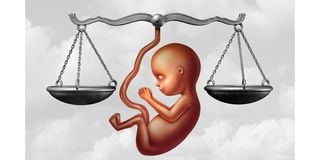Opinion divided after Benin legalised abortion

A new law that allows women in Benin to terminate pregnancy within the first three months has received divided opinion from stakeholders.
What you need to know:
- Opinion among various stakeholders in Benin is divided over the move by its parliament to legalise abortion.
- Under the new law, women will be at liberty to terminate their pregnancy within the first three months if it is likely to “aggravate or cause material, educational, professional or moral distress, and be incompatible with her or the unborn child’s interest.
Benin’s parliament recently voted to legalise abortion.
Under the new law, women will be at liberty to terminate their pregnancy within the first three months if it is likely to “aggravate or cause material, educational, professional or moral distress, and be incompatible with her or the unborn child’s interest.
Opinion among various stakeholders is, however, divided over the move.
Previously, abortion was legal only in cases of rape or incest, if the mother's life was at risk, or if the unborn child had a particularly serious medical condition.
The new law now awaits ratification by the constitutional court before it becomes operational.
Save human lives
Benin Health Minister Benjamin Hounkpatin was quoted by the media saying 20 per cent of maternal death complications in the country were as a result of abortions. He said more than 200 women die annually, due to abortion-related complications.
“It is because of this public health threat that the government has taken its responsibilities by submitting a text that lawmakers have passed. The new measure’s “unique goal” was to “save human lives” and that “voluntary termination of pregnancies will remain a last resort,” Mr Hounkpatin was quoted saying.
The Episcopal Conference of Benin, has faulted the move saying it was “highly preoccupied by the proposed law to legalise abortions”.
“Abortion not only destroys the life of the foetus but also that of the mother, in many aspects,” the religious group said in a statement, adding that “honest and reliable alternatives” exist.
A section of Benin women’s rights activists in the country have hailed parliament’s move, saying women should be left to make decisions for themselves.
Emergency treatment
Several African countries including Congo-Brazzaville, the Democratic Republic of Congo, Djibouti, Egypt, Guinea-Bissau and Senegal have total bans on abortion.
According to the Guttmacher Institute, a US-based research organisation, as of 2016, only Zambia, Cape Verde, Mozambique, South Africa and Tunisia had relatively liberal abortion laws.
Abortion in Kenya is regulated by Article 26(IV) of the Constitution, which states: ‘Abortion is not permitted unless, in the opinion of a trained health professional, there is need for emergency treatment if the life of the mother is in danger’.
The Constitution 2010 provides stronger protection for the lives and health of women compared to the old one.
Whereas the previous law only allowed abortion to protect the life of the pregnant woman, the 2010 law explicitly permits abortion when “in the opinion of a trained health professional, there is need for emergency treatment, or the life or health of the mother is in danger.
According to Population Reference Bureau, more than 227 million women worldwide, become pregnant annually and about two-thirds of them deliver live infants, with the remaining one-third ending in miscarriage, stillbirth, or induced abortion.
Stillbirths
The bureau adds that about four in 10 of all pregnancies are unintended and more than half of these end in induced abortion. It adds that an estimated 56 million abortions occurred each year between 2010 and 2014, and nearly half of those (25 million) were considered unsafe.
Most unsafe abortions happen in developing regions, which is also where almost all abortion-related deaths occur.
Unsafe abortions account for up to 13 per cent of deaths related to pregnancy and childbirth, and an estimated seven million women are treated for complications every year.
Pregnancy outcomes in developing countries is put at 14 per cent for miscarriages and stillbirths, 26 per cent induced abortions and 60 per cent live births.
Africa has the highest number of abortion-related deaths in the world. In 2014, at least nine per cent of maternal deaths (or 16,000 deaths) in the continent were from unsafe abortion.





